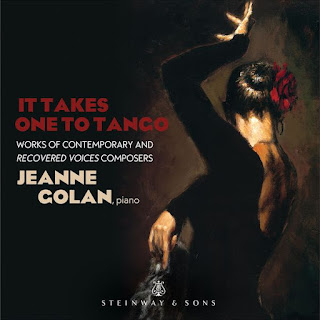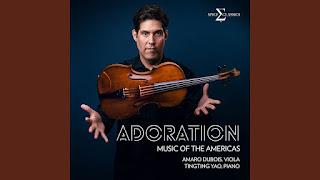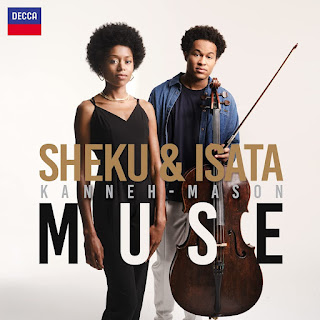The most valuable musicians and music people to me these days are those with the courage and insightful instincts when it comes to music we may have missed or not yet heard. In spite of periods in the last century or so where some felt it was a matter of recycling through the same, say 500 works, we now perhaps understand that the job of sifting through the many yet unheard works out there is never finished, for the reason that history is never about the exact same things endlessly repeating themselves, though sometimes it may feel like that!
And on that note we have today an excellent example of how an artist can weed through the many obscure items of past and present and come up with an unexpected and worthwhile blend of things we can grow into, grow with. I allude to a new CD by pianist Jeanne Golan entitled It Takes One to Tango: Works of Contemporary and Recovered Voices Composers (Steinway & Sons 30164).
It is piano music of character, more personally insistent than doctrinairely Modern, as personal as a signature or a special laugh maybe? At any rate it is a fine example of music we are glad to hear, played with a kind of devotion to the inner spectacle and special way of being that marks it all out.
Important to keep in mind that "Recovered Voices" according to the liners refers to "composers who were persecuted and often murdered as a consequence of the Nazi Regime." And in keeping with the title of the album all the pieces have direct or indirect reference to the Tango in its musical specialty, its rhythmic breadth and melodic-harmonic girth.
There is nothing superfluous, no space wasted, much music to come to know and appreciate, composers we may have far too little appreciation of, and in spite of what we think we know, there are surprises, happy ones contained within the 70-plus minutes playing time. Wanda Landowska, the "mother" of the modern harpsichord revival, gives us a short work that tantalizes, Toby Twining's "An American in Buenos Aires" appeals in a Golan arrangement for piano and toy piano, enchants in a bluesy directness. We get a goodly assortment of rediscovered casualties of the fascist refusal in the lively music of Wilhelm Grosz and Erwin Schulhoff, the latter in the substantial "Etudes de Jazz" of 1927. Then there are three captivating miniatures by Pablo Ortiz. All that is a good sample of the totality.
Ms. Golan shows how brightly, brilliantly musical and pianistic she is by virtually selflessly devoting all her focus to this endlessly interesting program. Viva her beautiful interpretive skills and her wonderful sense of discovery as she presents us with a delightful batch of things we might not have discovered were it not for her careful ear and critical soundness of judgement.
A topper of a program. There is every reason to like this one. Do not fail to give it your attention.









